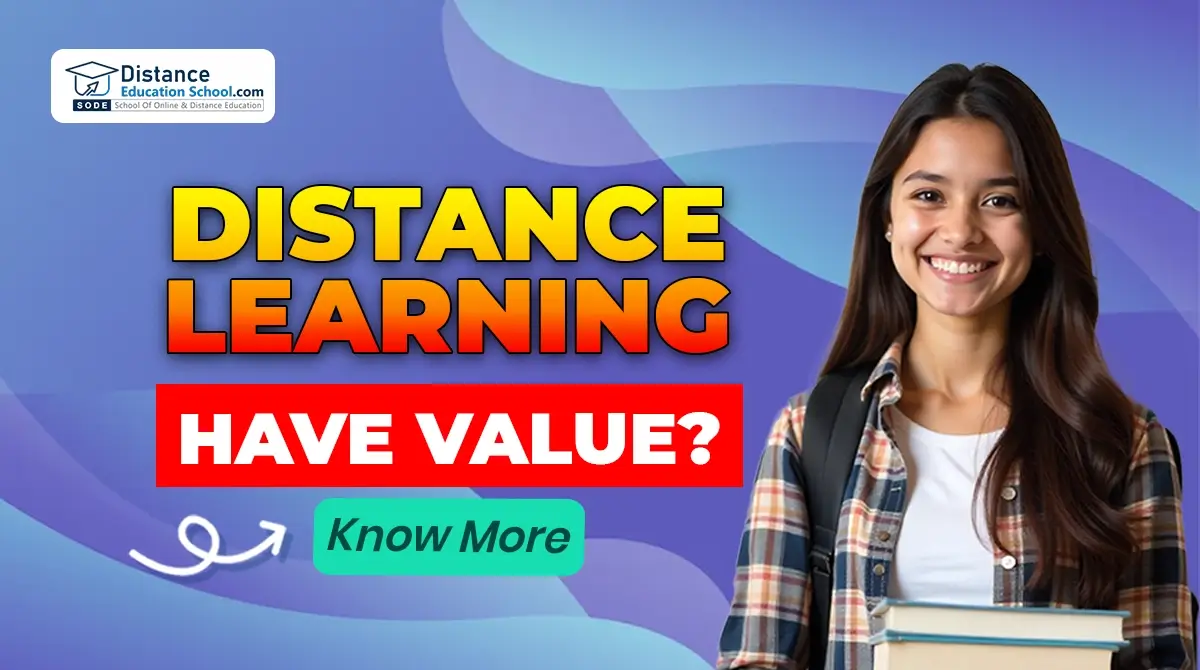
Does Distance Learning Have Value in 2026
In today’s fast-paced world, the idea of earning a degree without stepping into a classroom might seem too good to be true. Yet, distance learning in India has become a game-changer, offering students the flexibility to study at their own pace, from anywhere.
With the rise of online education platforms and recognized institutions, more individuals are turning to this alternative mode of learning. But, does a distance degree hold the same value as a traditional one?
In this blog, we’ll explore the true value of distance learning in India, and whether it opens doors to career opportunities in both government and private sectors.
What is Distance Learning
Distance learning refers to an educational model where students can study remotely, without the need to attend classes in person. It allows individuals to earn degrees, diplomas, or certifications through flexible learning methods.
There are two main types of distance learning:
- Online Learning: Involves virtual classes, where students interact with instructors and peers through digital platforms, attend live sessions, and access study materials online.
- Correspondence Learning: Primarily involves self-study with materials sent to students by post or email. Students often take exams at designated centers, with minimal interaction with instructors.
Unlike traditional learning, which requires students to attend physical classes and follow a fixed schedule, distance learning offers flexibility in terms of location and time, allowing students to learn at their own pace.
Is a Correspondence Degree Valuable in India?
Historically, correspondence education in India was designed for those who couldn’t attend regular classes, often perceived as less rigorous. Over time, however, accredited universities like IGNOU have improved the legitimacy of correspondence degrees, offering quality programs that are recognized by employers.
With modern technology, the learning experience has evolved, incorporating online resources, interactive content, and flexible learning platforms, making distance education a more valuable and credible option in India today.
Is a Correspondence Degree Valid for Government Jobs
Correspondence degrees are recognized by the government if they are accredited by authorized bodies like UGC-DEB (University Grants Commission-Distance Education Bureau). UGC-DEB approval ensures that distance learning programs meet academic standards, making them valid for government jobs.
Many government exams, including UPSC and SSC, accept degrees from UGC-approved distance education institutions. However, misconceptions persist that correspondence degrees are not accepted for government roles, leading to confusion. While distance education is valid, some candidates still face challenges in proving the credibility of their qualifications in specific sectors.
Is Distance Education Valid for Private Jobs
The private sector increasingly recognizes the value of distance education, especially as more top universities offer accredited online programs. Companies appreciate the flexibility distance learning offers, allowing employees to balance work and study, while also developing key skills such as time management and self-discipline.
Many top companies now hire distance education graduates, with success stories showcasing professionals who advanced their careers through online degrees. The growing acceptance of distance learning in the job market reflects its effectiveness in preparing skilled and motivated employees.
Advantages of Distance Learning
- Flexibility and Convenience: This approach allows working professionals and students to study at their own pace, balancing work, family, and education.
- Access to a Wide Range of Courses: Offers courses from top universities, expanding learning opportunities across various fields.
- Cost-effectiveness and Affordability: Normally, it is more affordable than traditional education, reducing the financial burden on students.
- Development of Self-discipline and Time Management: This approach encourages students to manage their schedules independently, enhancing personal skills.
Challenges in Distance Learning
- Perception of Inferiority: Distance learning is often seen as less prestigious compared to traditional education, despite its growing acceptance.
- Lack of Face-to-Face Interaction: Students miss out on direct interactions with peers and instructors, which can hinder networking and collaborative learning.
- Challenges in Practical Training: Hands-on experience and practical training are harder to achieve through distance education, especially for fields requiring lab work or field visits.
The Future of Distance Learning in India
- Integration of Digital Platforms: The use of digital platforms in education is expanding, with more interactive and engaging tools being developed to enhance the learning experience.
- Government Initiatives: Programs like SWAYAM and the National Institutional Ranking Framework are boosting the accessibility and credibility of online education, promoting it across India.
- Predictions for Growth: Distance learning in India is expected to continue growing, driven by technological advancements, increased internet access, and a shift toward skill-based learning. The demand for flexible education is set to rise, making it a key part of India’s education landscape.
Conclusion
Distance learning in India is rapidly gaining value due to its flexibility, affordability, and growing acceptance in both government and private sectors. With increasing digital integration and government support, it has become a legitimate and effective educational option.
While it offers many advantages, students should weigh the pros and cons, considering factors like course quality, career goals, and personal learning preferences, before deciding if distance education is the right investment for their future.
Most Popular Blogs

Online BCA Courses in Jain University Online

Distance Education at Pondicherry University

Top 4 colleges to pursue Distance BBA in Andhra Pradesh

What are the top distance BSc colleges in Kerala

Know about the top 3 distance BCom universities in Madhya Pradesh



















